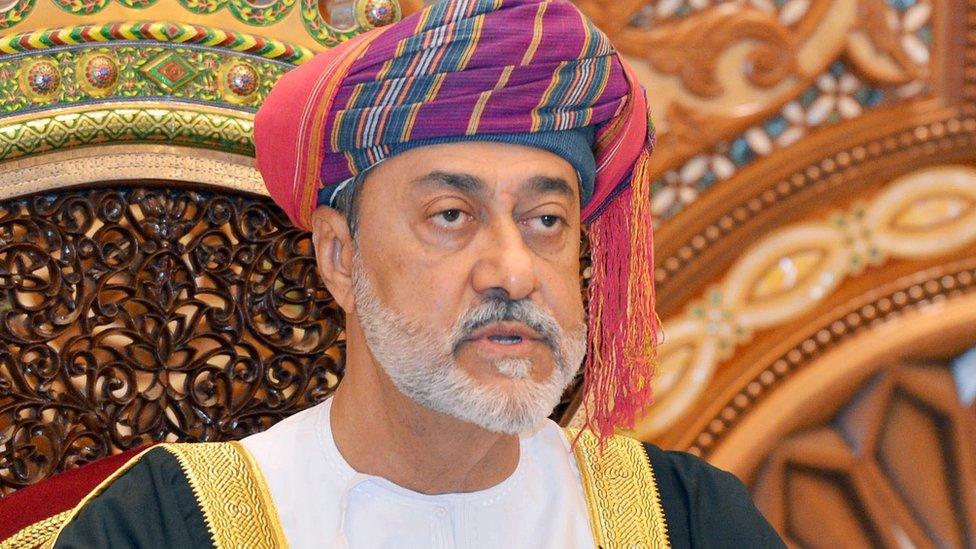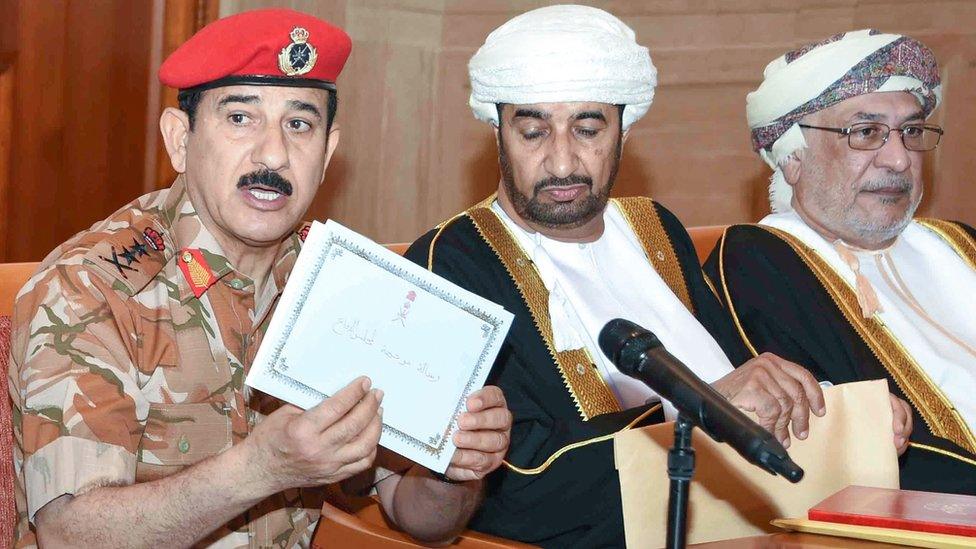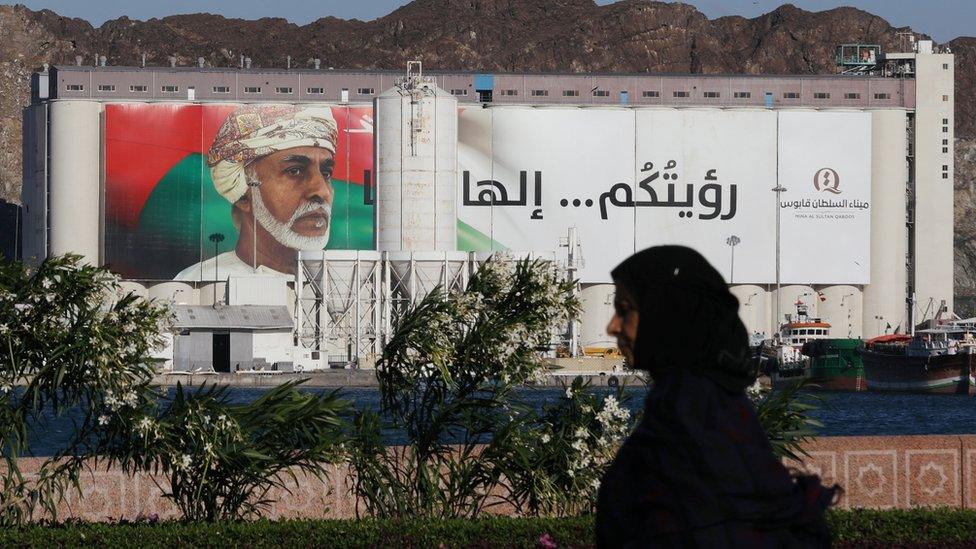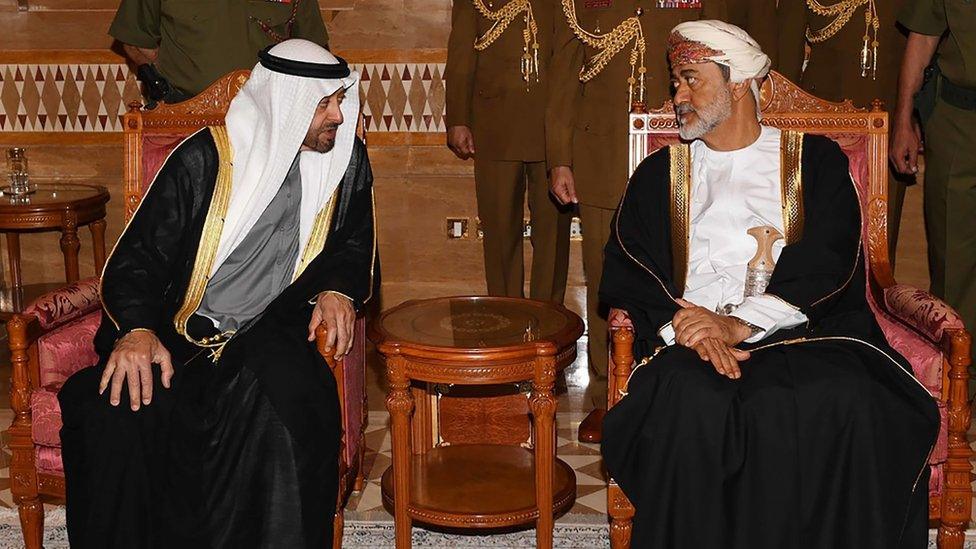Oman's new sultan faces mammoth challenges
- Published

Haitham bin Tariq Al Said, a cousin of Qaboos, was sworn in as sultan
The announcement of the death of Oman's Sultan Qaboos earlier this month was followed by a chorus of praise for the achievements of the "father of the nation" - often tainted with a disturbingly Orientalist flavour - that overlooked the fact his grace period had long since come to an end.
Many Omanis consider that the late sultan, who had been increasingly isolated and reclusive and who had refused to lay the foundations for governance of a post-Qaboos Oman by appointing a prime minister or by nurturing a successor, had become more of a problem than a solution.
Like his counterparts in the Gulf Co-operation Council (GCC), he had made clear after the "Omani Spring" in 2011 - when thousands of people took to the streets to demand more jobs, better wages and an end to corruption - that the centre of political power, combining both executive and legislative powers, should remain his personal prerogative, closed off from any debate.
The regime perpetuated what a United Nations special rapporteur called in 2014 a "pervasive culture of silence and fear affecting anyone who wants to speak and work for reforms in Oman".
Investments in the security sector were a priority, consolidating Oman's top position in the world for defence and security spending as a proportion of its gross domestic product (GDP).
Thus, tremendous challenges await the new sultan, Haitham bin Tariq, as a result of the stasis that characterised the last two decades of Qaboos' rule.
Sultan Qaboos bin Said Al Said of Oman
Born in 1955, the son of Qaboos' paternal uncle, Haitham served as undersecretary, then secretary-general, in the ministry of foreign affairs, before becoming minister of national heritage and culture in 2002.
Haitham, whose oldest son Dhi Yazin is second secretary at the Omani embassy in London, was the UK and Abu Dhabi's preferred choice as sultan.
He enjoys support among Oman's intelligence services and the most influential governmental body, the Palace Office.
He also benefits from proximity with local merchant elite, through personal and business connections he has established with a number of them.
Haitham was among the first Omani royals to set himself as a businessman.
In the 1990s, he became shareholder of Sun Farms agricultural company, a major land owner and top vegetables producer in Oman.
He has substantially increased his involvement in business ventures since then, through a holding company (NTC) he holds and chairs.
In particular, the group partly controls Oman's largest power company, SMN Power, a joint-venture with Abu Dhabi fund Mubadala, which is chaired by Crown Prince Sheikh Mohammed bin Zayed, and French energy company Engie's UAE-based affiliate.
Haitham also shared stakes in the Blue City project, a mega tourism-devoted new city south of Suhar. However, mismanagement and legal battles between the owners resulted in Oman's most resounding bankruptcy ever and the intervention of the state's sovereign wealth fund in 2011-12 to buy Blue City bonds.

Qaboos is said to have left his choice of successor in an envelope, which the ruling family council opened
A few hours after the announcement of the old sultan's passing came the heavily choreographed ceremony of the opening of the sealed letter, in which Qaboos is supposed to have named Haitham as his successor.
This was critical to ensure that the new leader, who enjoys limited legitimacy among the broader population, benefited from the authority bestowed upon him by Qaboos.
This staged investiture, followed by pledges of allegiance by other political elites, does not say anything, though, about potential dissension within the royal family and external interference in the succession choice.
Only history will reveal, but the composition of Haitham's first cabinet will give indications about his strategy of family control and, more generally, of elite management.

Sultan Qaboos set Oman on a path to development, using its oil wealth
Haitham's other main challenge is to oversee Oman's transition from over-reliance on oil revenues to a diversified economy.
The Omani population is one of the youngest in the world: 46% of its citizens are under 19.
Policies favouring Omanis in employment for the last 20 years have had limited results, as illustrated by dramatic social inequalities, endemic unemployment, and poverty.
The World Bank estimates unemployment among 15-24 year olds is 49%.
Real GDP growth turned negative (-0.9%) in 2017 and remained low in 2019 (0.3%).
Since 2015, Oman has run high budget deficits and in 2018 rating agencies Fitch and Standard & Poor's downgraded Oman's credit rating to "junk".
The International Monetary Fund expects Oman's debt to reach 61% of GDP by 2020, compared to 17% in 2015.
This is likely to have a direct impact on the new sultan's regional policy.
While Oman will not lose its title of the UK's oldest friend in Arabia in the near future, given its exorbitant political and military dependence on the UK and the US, Haitham may find difficult to deflect the UAE's increasing infringement on Oman's sovereignty.
The UAE is Oman's primary economic partner and trade between them is only likely to grow further in the years to come. Many citizens from northern Omani regions also work in Abu Dhabi and Dubai, which has prompted concern in Muscat about the allegiance of the regions in the long term. Moreover, Abu Dhabi, Muscat and Riyadh have been competing for influence in eastern Yemen, which borders Oman, by supporting different local actors.
Oman's decision in 2018 to prohibit GCC nationals from owning property in governorates bordering Saudi Arabia and the UAE reflects Muscat's worry towards its neighbours.
There are fears, though, that the new sultan might prefer to turn an unfortunate blind eye to the UAE's imperial ambitions, in the name of Muscat's need for Abu Dhabi's money.

The new sultan has held talks with regional leaders, including Abu Dhabi's Mohammed bin Zayed
In 2013, Haitham became chair of the committee responsible for developing a new long-term national strategy, Oman Vision 2040.
Inspired by the same international consultancy companies that have force-fed plans across the Middle East, including in Saudi Arabia, the preliminary document issued in January 2019 advocated for the privatisation of public infrastructure, education and health services, the reduction of subsidies and the introduction of regressive taxes disproportionately impacting the poor - all measures which have resulted elsewhere in increased inequalities and popular unrest.
Given this track record and Haitham's personal history in business, there are reasons to take a circumspect approach towards the Vision 2040 plans, especially since a further structural issue lies in the number of political decision makers holding business interests.
As everywhere in the world, the government's attempt to justify large-scale austerity measures for the sake of sustainable development, while merchant and royal elites preserve their own economic privileges and a secured flow of rents, has become unacceptable for young Omanis, who are not willing to grant Haitham the same degree of authoritarian paternalism that their parents gave Qaboos.
Indeed, if Haitham does pursue the top-down, neo-liberal reforms that have been announced, pointing towards a deepening concentration of wealth and power instead of promoting a new social contract that would offer a more equitable distribution of wealth from natural resources and a more participatory decision-making process, these are likely to provoke renewed popular frustrations and herald considerable turmoil.